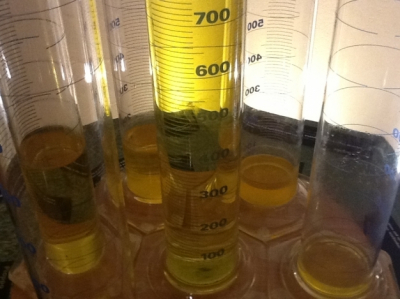Why so much talking about anti-oxidants?
At present, available scientific evidence have not allowed to prove the superiority of extra virgin olive oil with respect to other vegetal fats beyond any reasonable doubt, yet. Still, it looks like the role of it in the Mediterranean diet is probably more complex than it was believed so far

Waiting to Simei 2015, scheduled in Milan from 3rd to 6th November 2015, we present a report by Francesco Visioli on a much debated topic. In the next edition of Simei there will be many workshops dedicated to the olive oil, by Olio Officina Magazine
How could a nutritionally perfect extra virgin oil be obtained?
The growing popularity out of its areas of origin of the Mediterranean diet, whose main source of fats is olive oil, has stimulated the interest of researchers and nutrition experts about its health enhancing properties. The emphasis on the (true or supposed) nutritional qualities is not always supported by scientific evidence, but research in this field is advancing fast. We will draw a balance of the research developed about olive oil and human health, focusing on the role of “minor compounds” and providing with the basis to understand the potential healthy activities of a quality olive oil.
Why so much talking about anti-oxidants? The uncontrolled production of free radicals in biologic systems, their relationship with the origin of degenerative pathologies and the role of anti-oxidants in the control of these processes have been matters of discussion involving pathologists, biochemists and food scientists for several decades.
Still, only recent, solid experimental observations permitted to propose a well defined role of bio-molecules in the pathogenesis, when they are altered by oxidative processes. Among these molecules, there are LDL (the so-called “bad cholesterol”), proteins and DNA. Such a working hypothesis and the experimental findings supporting it created great interest for anti-oxidants, first and foremost for those present in food.
What is true? Some evidence in support of the formation of oxidized LDL have been produced in vivo, whereas the evaluation of the higher oxidability of LDL in in vitro systems is correlated to the in vivo evolution of atherosclerosis, thus predicting it. Scientific researches has been progressing fast for oxidized proteins too, especially in the field of ageing, where the oxidation of proteins plays a key role (it can be estimated that an 80 years old individual can have up to 80% of his body proteins oxidized).
Data relevant to DNA, whose oxidation could be at the origin of genes mutations leading to cancer, are less apparent. Still, these hypotheses are notoriously hard to verify in vivo in a patient, because of the limited technological tools that do not permit to characterize and accurately dose the products of oxidation, yet. As suggestive as these conjectures can be, they still need to be proved beyond any reasonable doubt, even though there is already a good number of experimental evidences in their support.
However, the theory according to which a Mediterranean diet, rich in anti-oxidants and olive oil (which contains the oleic fatty acid – mono-unsaturated and hardly oxidable) can prevent pathologies originating from oxidative processes, was grounded on those hypotheses. In support to it comes the observation that cardiovascular risk factors (e.g., high cholesterol and hypertension), are not too different in Mediterranean populations and in populations where the incidence of cardiovascular diseases is higher. Thus, other preventive factors likely intervene to contribute to reduce the risk.
Thanks to the oleic acid? The Mediterranean diet is characterized, from the point of view of fat content, by an abundant consumption of olive oil. Its use as a dressing and as main food fat allows to considerably reduce the use of saturated fats, such as those deriving from butter and other dairy products, largely used in Northern Europe.
The high consumption of oleic acid from olive oil has been deemed responsible for most of the beneficial effects of the Mediterranean diet. There are valid reasons to put this statement under scrutiny, though. First, a comparison between the Mediterranean diet and the one typical for instance of the USA or UK, shows a very similar percentage content of oleic acids. Indeed, if in the Mediterranean the consumption of olive oil is copious, in Anglo-Saxon countries an adequate intake of oleic acid is attained through other foods such as chicken and pork. Also, the organism can synthesize oleates from parent compounds: differently from poly-unsaturated fatty acids (essential fatty acids) that cannot be synthesized within the body, the oleic acid can derive from acetate via known metabolic paths.
Another popular notion is that the oleic acid has a favorable effect from the lipo-proteic standpoint, by reducing the rate of LDL. Actually, studies carried out in controlled conditions have shown a limited or negligible effect of mono-unsaturated fats when they substitute carbohydrates, in a isocaloric diet. Olive oil basically has very few direct effects on levels of blood cholesterol and the benefits of a diet rich in oleic acid are mainly dependent on the simultaneous reduction in the level of saturated fats. Hence, celebrating and promoting olive oil for the control of cholesterol is not supported by scientific evidence.
From the point of view of health, poly-unsaturated fatty acids, especially Omega-3 acids, are more important. They are defined “essential” since our organism is not able to synthesize them (so that they have to be taken in through the diet) and their quantity is considered too low in the Western diet. The production of Omega-3 rich olive oils could enrich their nutritional profile, too.
The unsoapable fraction of olive oil. Beyond its particular composition in fatty acids, first squeeze olive oils contain minor compounds that contribute to its peculiar taste and aroma. This is due to the fact that olive oil is the only vegetal oil obtained from the whole fruit and not only from the seeds, so that it can maintain all the organolpetic properties of olives.
Remarkably, extra virgin olive oils are way richer in phenolic compounds than refined oils, derived from rectification of oils which were originally too acid, virtually deprived of phenols. Briefly, top quality oils are rich in phenols (and vice versa).
The average yearly intake in Mediterranean countries goes from few kg/person up to as much as 15 kg/person. In the highest intake areas, the daily intake can be as high as 50 g/person, thus providing approximately 25 mg of phenols per day. This extent, computed as the total quantity of flavonoids (contained by apples, onions, etc.. too), is correlated to a lesser incidence of cardiovascular disease.
The growing interest for the chemistry of natural anti-oxidants and the diffusion of the Mediterranean diet, more and more popular in the USA and Japan, has stimulated research groups to investigate the potential anti-oxidative effects of certain compounds which have been identified and isolated from extra virgin olive oil. The goal is to further explain the role of olive oils and their minor compounds in the protection of the cardiovascular system.
Phenolic compounds are powerful anti-oxidants (in vitro). Several studies about the anti-oxidative activity of olive phenols, both in terms of extra virgin olive oil and vegetation water, have already been published. The state of the art is already so advanced that it has allowed to identify the oxidative species against which olive phenols (most notably, hydroxytyrosol and oleuropein) act. Many studies have also been carried out on cellular systems and on isolated DNA. The power of olive phenols depend on the substrate too, but it is often greater of other known anti-oxidants, such as E vitamin, by far. The applications of anti-oxidative activities of hydroxytyrosol and secoiridoids are in growing development and industrial patents have already been deposited.
Not only anti-oxidants (other biological activities of minor compounds of olive oil). Potentially beneficial effects on human health of phenolic compounds are not limited to anti-oxidative actions. Several interesting biological activities have been studied and could unveil new functions of these compounds in the prevention of certain diseases. The formation of thrombi, for instance, is favored by an excessive platelet (type of blood cells in charge of forming the haemostatic plug) aggregability. Such a function, obviously essential in presence of excessive bleeding, for instance following a cut, is definitely harmful when platelets aggregate inside blood vessels, coagulating and forming thrombi, which can occlude the vessel lumen, thus opposing the blood flow through it (such as in the case of myocardial infarction).
Phenolic compounds extracted from olive oil, especially hydroxytyrosol, are able to inhibit platelet aggregation. This anti-thrombogenic property is associated to a reduced production of inflammatory factos, such as thromboxane and leucotriens, produced by platelets (the former) or cells involved in inflammatory processes (the latter).
Other studies demonstrated that oleuropein is able to increase the synthesis of nitric oxide, a molecule with a strong bactericide and cytostatic power, by macrophage (immune cells). This further activity suggests that oleuropein favors the immune response to bacterial attacks, by stimulation of specific enzymes. Finally, a recently published work has demonstrated that hydroxytyrosol has a neuro-protective function too, both in vitro and after oral administration.
The study of biological activities of olive oil phenols is still open and more unknown, healthy properties could be brought to light in the immediate future.
And in humans? The fact that the biological activity of natural compounds have been demonstrated in vitro does (in cell cultures or test-tubes) not necessarily imply a health-protecting function into the organism. From this point of view, studies on extra virgin olive oils have reached a significant advancement, much more than with other food, such as wine and tea. The intake of hydroxytyrosol and phenols has been extensively studied and their metabolism has been explained. To date, about 15 studies on humans (either healthy volunteers or patients) have been published and a dozen of them show the superiority of extra virgin olive oils rich in phenols on olive oils and seed oils, in terms of biological activities.
Conclusion. At present, available scientific evidence have not allowed to prove the superiority of extra virgin olive oil with respect to other vegetal fats beyond any reasonable doubt, yet. Still, it looks like the role of it in the Mediterranean diet is probably more complex than it was believed so far. Its healthy properties are not limited to the intake of oleic acid, which, as previously pointed out, is not missing in other diets, but they are related to its phenolic component. The use of high quality oil allows the consumption of compounds, whose effect in humans is still to be fully understood, correlated to a lesser incidence of cardiovascular diseases and cancers.
The taste of high quality extra virgin olive oils allows a more moderate use, subsequently reducing the overall caloric consumption and it encourages the consumption of fresh vegetables, whose common dressing is extra virgin olive oil, in the Mediterranean diet. In conclusion, the moment has come to recommend producers to search the best quality and consumers to prefer high quality oils which permit to include potentially healthy compounds in their diet. Many more years of research, both agronomic and scientific, are necessary in order to shed light on the true or supposed properties of polyphenols and fatty acids, so that a nutritionally perfect olive oil can be obtained. In the meanwhile, on the basis of the available scientific data, we recommend to use oils rich in phenols, although they are expensive, in the context of a diverse and balanced diet.
To comment you have to register
If you're already registered you can click here to access your account
or click here to create a new account


Comment this news